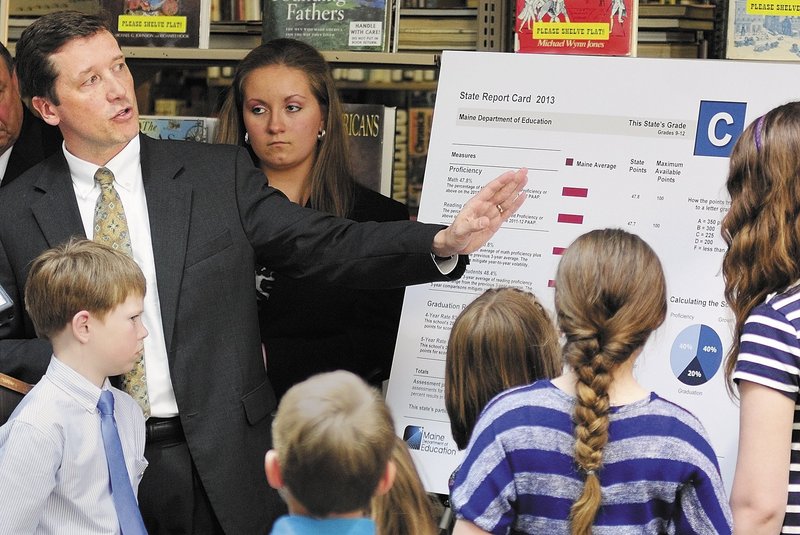TALLAHASSEE, Fla. – I am not in tune with Maine politics, so far be it from me to inject myself in the never-ending political scrum between the liberal media and a conservative governor. It is, as Mrs. Potts once sang, a tale as old as time.
But I am in tune with the newest issue that has put Gov. Paul LePage and the Portland Press Herald at odds — the concept of grading schools like you grade the kids in them.
It seems you think turnabout is foul play.
The newspaper’s position amounts to this: We can’t grade schools because schools cannot control all elements responsible for student success, including family income. And so we have to hold off on accountability until we achieve the mythical, utopian state of Lake Wobegon, where poverty has been abolished and where all children are above average.
That will never happen, of course, which is the point.
I heard the same arguments in Florida in 1999, and even agreed with most of them. Back then, I was a liberal media guy and the governor pushing the grading plan was a hard-core conservative whom I had voted against twice.
Our first round of results was as dismal as yours. We had more D and F schools than A and B schools. We heard the same shrill protests from unions and school administrators.
But for the first time, we saw schools nobody knew existed on the front page of the newspaper. They had been kept a deep, dark secret, sitting neglected and quietly promoting illiterate children into future failure.
The grades ended the neglect. Confronted with a public outing of failure, the school districts moved to correct it. Resources were reallocated and schools received more effective administrators and teachers. Reading scores hit new highs for low-income and minority kids.
We’d be happy to send the editorial board our PowerPoint with all the data. Schools that were routine failures now routinely earn A’s and B’s. We see their students celebrating on the front page of the newspaper. This is because the grading formula takes into account learning gains as well as overall scores, just as does the Maine formula.
Yes, poverty matters. And no, you can’t expect miracles. But you can expect improvement. And when you expect it, you get it. What does it say that your youth hockey leagues expect more out of kids than your schools?
Here is a secret about failure: When you hide it, you enable it. When you expose it, you force people to deal with it.
Here is another secret: Failure is never the fault of the people in charge. It’s the parents’ fault, the students’ fault and most certainly it is the budget’s fault. Keep throwing more money into the chipper and if that doesn’t work, then obviously it wasn’t enough. Just don’t question the business model because far too many people are vested in it.
Demanding that people do a better job works wonders. It actually works better than handing them another bag of money and hoping for the best.
I will close with this.
In checking the Press Herald’s coverage of education, I found this item from a 1999 story: “Once again Maine students lead the United States in reading. Maine’s eighth-graders are first in the nation on the National Assessment of Educational Progress and our fourth graders are in a tie for second.”
Great news!
But the news wasn’t so great in this 2003 story: “Maine’s scores in the nation’s only federally mandated test for students (NAEP) haven’t improved for the most part over the past decade, while many other states have gained ground.”
You might want to do an update. And you will find that another 10 years have passed without any improvement.
Have Colin Woodard check it out.
Maine has gone from a national leader in reading to getting left behind by your New England neighbors. Even Florida’s fourth-graders are passing you despite our state’s more challenging demographics.
I would humbly suggest that a continued strategy of hiding the problem is optimal for adults in the system, but hardly is in the best interest of your children.
Mike Thomas, a former newspaper columnist, is an editorial producer for the Foundation for Excellence in Education, an education policy group based in Florida. He is still a liberal.
Send questions/comments to the editors.



Success. Please wait for the page to reload. If the page does not reload within 5 seconds, please refresh the page.
Enter your email and password to access comments.
Hi, to comment on stories you must . This profile is in addition to your subscription and website login.
Already have a commenting profile? .
Invalid username/password.
Please check your email to confirm and complete your registration.
Only subscribers are eligible to post comments. Please subscribe or login first for digital access. Here’s why.
Use the form below to reset your password. When you've submitted your account email, we will send an email with a reset code.